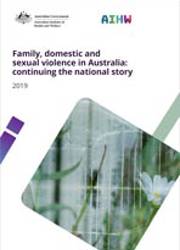National Survey of Workers in the Domestic, Family and Sexual Violence Sectors
First year: 2018
Latest year: 2018
Frequency: 2018
Years in this publication: 2018
Size: 320 services, 1,157 workers
Methodology: Survey
Geography: National
Purpose/description:
The survey was designed to collect information about workers in services used by people affected by family, domestic and sexual violence. The survey examined models of service provision, workforce strengths and gaps, workers’ skills and development needs, service capacity and sustainability challenges. The aim of the survey was to inform efforts to build capacity of the workforce and service system to improve responses to people affected by violence. The survey consisted of 2 parts: a survey of workers and a survey of service leaders.
Scope and coverage:
The survey of workers captured the experiences of those working in services used by people affected by violence, including information about confidence in areas of practice, and job satisfaction. The survey of service leaders captured service-level information about staff numbers, perceptions of capacity, and workforce development priorities and strategies.
As there is no comprehensive list of relevant services across Australia, a sampling frame was developed to help identify relevant service providers, based on funding provided by the Department of Social Services and the Attorney-General’s Department. In addition, lists of services funded by the states and territories were provided by the Department of Social Services. Services included (but were not limited to):
- services funded under the Australian Government Families and Children Activity
- Australian Government-funded Legal Assistance services
- Australian Government-funded services under the Settlement Grants program
- Australian Government-funded services under the Financial Wellbeing and Capability Activity
- services funded under the specialist homelessness service program
- services funded under specialist perpetrator programs.
The service survey was distributed to 1,000 services and completed for 320 services. The worker survey was completed by 1,200 workers. As there is no national data set providing a profile of relevant services which could be used to determine population weights, no weights were applied. The survey is not intended to be representative of the entire workforce. Instead it sheds some light on the shared experiences of workers in the family, domestic and sexual violence space.
Definitions of FDSV services:
There are no comprehensive lists identifying services as family, domestic and sexual violence specific. Due to this, in-scope services were categorised according to the following ‘main service types’:
- Commonwealth-funded Families and Children Activity: includes Family and Relationship Services, Family Law Services, Communities for Children, Children and Parenting, Young People, Adult Specialist Support Services.
- Commonwealth-funded Legal Assistance Services: includes Legal Aid, Community Legal Centres, Aboriginal and Torres Strait Islander legal services, and family violence prevention legal services.
- Commonwealth-funded Settlement Grants Program: provides support for humanitarian entrants and other eligible migrants in their first five years of life in Australia.
- Commonwealth-funded Financial Wellbeing and Capability supports vulnerable individuals, families and communities to improve their financial capability, resilience and lifetime wellbeing, including through Financial Crisis and Material Aid, and Financial Counselling, Capability and Resilience.
- Specialist Homelessness Service, refuge or other housing, tenancy, or accommodation support: includes services focused on accommodation and related supports funded from any source.
- Other service used by people affected by family and domestic violence: this category captures other domestic violence services not captured above.
- Other service used by people affected by sexual assault: this category captures other domestic violence services not captured above
- Specialist perpetrator program
- Other: included multi-service agencies unable to select a main service, and those specifying mental health, Alcohol and other drugs, education, foster care, disability or others which could not be classified in the above categories.
For more information, visit the National survey of domestic violence and sexual assault workforces.



